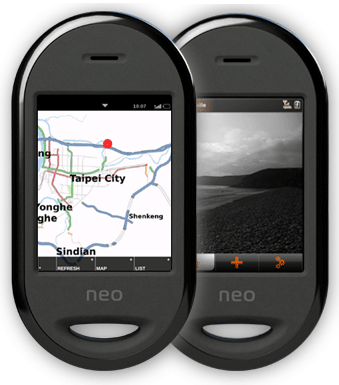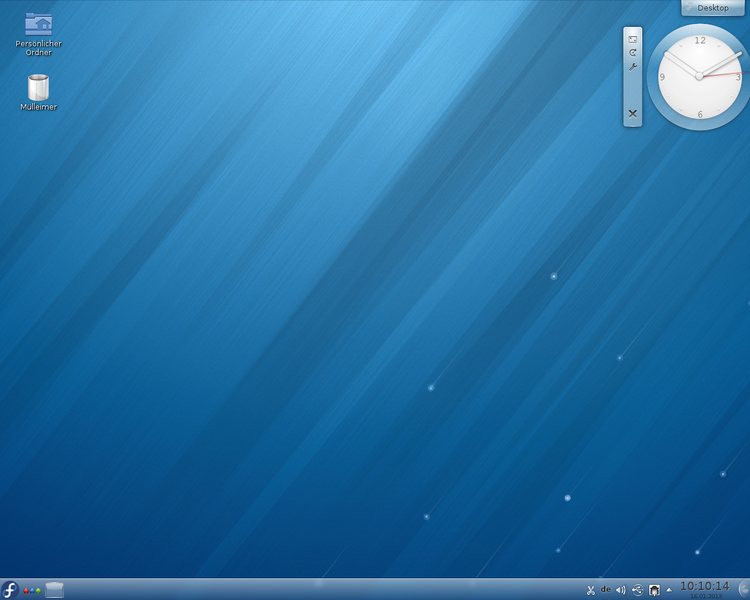12.10.13
Posted in GNU/Linux at 7:33 pm by Dr. Roy Schestowitz

Summary: Perhaps a phone which Richard Stallman can use is already in the making, depending on how phone networks behave and how hardware behaves (whether it permits purely Free/libre software shim)
RECENTLY when I traveled to meet Richard Stallman we spoke for a bit (off the record) about OpenMoko and some other platforms which require blobs to operate with physical boards. Stallman said that OpenMoko had dodged the backdoor mechanism that is included in the vast majority of mobile phones.
Well, the good news is that Jolla/Sailfish hardware is here now [1,2] and while mobile (GNU/)Linux is gaining huge market share [3] we also see OpenMoko making a comeback [4], as noted earlier today. What will all these efforts bring? Hopefully a freedom- and privacy-respecting phone, bar the surveillance by phone networks (Stallman mentioned some ways in which this can be circumvented). █
Related/contextual items from the news:
-
We just found this new information on a company who have been making a new 3D printable case for the Jolla phone.
You can read more here and best of all, if you have a 3D printer, the plans are also available to download here at thingiverse.
-
If there’s one thing you can learn from the maemo/meego community, it will be that it never lets you down!
-
The Linux kernel which is supported by most hardware-makers to run on almost anything is a great base. The GNU system or the Android system are both advantageous: they are Free Software and come with few restrictions and all the right permissions to promote global proliferation, they cost about $0 so any OEM large or small can use them and they are made by users for users so millions like it.
-
Neo900.org has begun production of its open source Neo900 phone, an update to the Nokia N900 that can run GTA04 (OpenMoko Debian), Maemo, and other distros.
Germany-based Neo900.org was announced in October, as a spinoff from OpenPhoenux, which itself was a spinoff from the splintered OpenMoko open source smartphone project.
Permalink
 Send this to a friend
Send this to a friend
Posted in GNU/Linux at 7:17 pm by Dr. Roy Schestowitz
Summary: A call for Android developers to take privacy more seriously and not turn users of Android devices into products
In terms of privacy, Nexus is a scary thing and it keeps getting scarier over time. Google remotely modifies it without the user’s consent and with each modification it does less and less to respect privacy, installing yet more privacy-infringing software (without consent) and changing the settings to silently give away more personal information.
CyanogenMod is adding encrypted text messaging [1,2], beating Google to it if Google ever plans to support such a feature at all. To be fair to Google, it does share source code [3,4] and this enables forking, but why not make Android freedom-respecting and privacy-respecting by default? The values of Linux and Free software include privacy. There are many articles right now about rogue apps that get too much access to location [5] — something which Google got wrong and continues to get wrong every time automatic update kicks in and overrides settings. Yes, Google is ‘upgrading’ my tablet without my consent and then does all sorts of privacy-infringing things. I regret to say that Google does this. Some people manually ‘upgrade’ to 4.4 [6], but when it comes to Nexus 7, the user is just asked to reboot (after a silent ‘upgrade’), whereupon settings change a little, and silently so. Google says it wants to improve the camera [7,8], but based on some writings on the Web, Google actually cripples it with the ‘upgrade’ and it continues to pose privacy issues (like embedding location data in images or automatically uploading images in the background).
Android is inspiring and helping to build many Linux devices these days [9,10], so we need to keep Google in check and ensure it does not deviate further in the direction of “evil”. With each automatic ‘upgrade’ of my tablet it seems to be getting a lot more like Orwell’s fears. █
Related/contextual items from the news:
-
-
-
-
-
An Android developer has agreed to settle charges with the Federal Trade Commission (FTC) over a free flashlight app that has been “deceiving” users.
-
-
-
-
Marvell unveiled a more secure, graphics-rich Armada 1500 Plus SoC for Android 4.2.2 smart TVs “with Google services,” but never mentioned Google TV.
-
Permalink
 Send this to a friend
Send this to a friend
Posted in Europe, GNU/Linux, Google, Microsoft, Patents, TomTom at 3:52 pm by Dr. Roy Schestowitz
Microsoft extortion red-flagged in Germany

Summary: A new ruling in Germany threatens Microsoft’s campaign of fear and racketeering against Android (and GNU/Linux), but Microsoft allies from the now-defunct Novell help patent-pushing efforts, threatening to add new bait to Android
The traitorous company known as Xamarin, run by former Microsoft staff and a Microsoft MVP (also funded by people from Microsoft), keeps pushing Mono (Moonlight is dead now) into Linux and Android, no matter how strongly users are rejecting it. Now they go after Google’s CCTV Glass, trying to make it Microsoft dependent (including patents).
“Xamarin is now (more than before) very closely connected to Microsoft and it is funded by former Microsoft executives.”People like Miguel de Icaza once pretended that Microsoft would not sue, but even de Icaza had to shut up when Microsoft actually sued TomTom in 2009. Why are these people still pushing Mono into Linux and Android (not to mention Wine [1])? Well, that’s simple. Xamarin is now (more than before) very closely connected to Microsoft and it is funded by former Microsoft executives. They are up to no good.
It should be noted that based on my phone conversations with the OIN’s president, Microsoft typically uses FAT patents to sign patent deals which it characterises as "Linux" ones (TomTom’s included).
People should now shun Xamarin and avoid all Microsoft APIs (Samba got exemptions only after a very long antitrust battle in Europe). It oughtn’t be shocking that those who remain interested in Xamarin’s work are all sorts of developers who hang out in Microsoft forums and develop with Microsoft products; they are not GNU/Linux users.
“Now that the FAT patent may be in its deathbed we need to ensure that Microsoft does not ‘plant’ more such traps/bait (like C#) in Linux/Android.”Now we come to the rather important news. In this age when large companies reject the idea of software patenting and most countries in the world do likewise it was rather shocking to find a FAT-related patent upheld in Germany some years back (April 2010). It was pretty much against the law and it helped Microsoft impose a reign of terror on some companies that use Linux in their products.
Well, according to this bit of news that links to a deceiving Microsoft lobbyist as the source, Microsoft’s FAT patent got invalidated and later coverage helped confirm this. While nobody knows if Microsoft actually makes money from Android (it's all speculations from unreliable sources), Steven J. Vaughan-Nichols says that Microsoft FAT patent loss endangers its Android revenue. “A patent loss in a German court may lead to trouble for Microsoft’s Android strategy,” Vaughan-Nichols writes.
As one person put it today, “it’s not the news I wanted to hear “Microsoft could appeal” but its a step in the right direction.”
It’s almost as though Germany might actually uphold EU law for a change, at long last rejecting software patents in spite of distortion of the facts from Microsoft Florian and other pseudo-European lobbyists like ACT.
Now that the FAT patent may be in its deathbed we need to ensure that Microsoft does not ‘plant’ more such traps/bait (like C#) in Linux/Android. We need to shun Xamarin and explain to people who Xamarin, the Trojan horse, is really serving. Android already reduced its dependence on some Microsoft patented blobs (like ActiveSync). It needs none of the same troublemakers. This isn’t the first time that Xamarin tries to push Mono into Android [1, 2, 3, 4, 5, 6, 7, 8, 9, 10, 11, 12, 13, 14, 15, 16] and it definitely won’t be the last. █
Related/contextual items from the news:
-
Permalink
 Send this to a friend
Send this to a friend
Posted in GNU/Linux, Google, Microsoft at 2:34 pm by Dr. Roy Schestowitz

Summary: Xbox Live caught in the latest NSA scandal and the high degree of collusion seems to be reinforced by Microsoft’s reluctance to comment; other developments like Microsoft’s attack on rivals using the “privacy” card
WE already know, based on previous evidence, that Microsoft used broken/weak/no encryption in order to facilitate surveillance. There are also known concerns, as we noted earlier this year, that Xbox One may be spying on people’s homes (cameras inside rooms and other sensory data transmitted over the network). Almost nothing is as monstrous a surveillance device/appliance as Xbox; Microsoft even has patents indicating intent.
Making the rounds these days are news articles about Xbox Live coming under NSA surveillance [1,2,3,4], with agent provocateur tactics, recruitment of gamers, and so on. Microsoft has not provided any comment to deny this or to denounce the NSA, so complicity is likely here.
In other curious news about Xbox, it turns out to be self-bricking. As one report put it: “Online trolls tricked Xbox One owners into “bricking” their new consoles with instructions promising to unlock new features but actually sending devices into an endless loop of reboots that renders them useless”
“Online trolls” now include GCHQ and NSA employees, so here we have another reason to be suspicious of their motives. Xbox should, from now on, be viewed as NSA-friendly and therefore perpetually avoided, not just because it’s proprietary and managed by an abusive monopolist. In news that was covered here before, as well as mentioned in Slashdot, the FSF tackles the “proprietary with trust” myth. As IDG put it: “The Free Software Foundation on Thursday attacked Microsoft for “meaningless” public statements on privacy and security, claiming that Windows is “fundamentally insecure.””
The fallacy of ‘open’ ⇆ Free/libre matters here and the FSF uses a productive approach even though it neglects to mention Microsoft’s ‘special relationship’ with the NSA. The above article got mirrored in several other IDG sites (some in non-English-speaking countries), so the FSF did have a big impact.
All these revelations matter, especially now that Microsoft tries to demonise Google using the “privacy” angle. As one author put it, “Microsoft Really Doesn’t Want You To Buy A Chromebook” and it even started a whole deceiving campaign about it. As Pogson put it the other day, Microsoft “is spending more on advertising Chromebooks than Google is… All those users of personal computers who don’t use M$’s office suite, spreadsheets, and PhotoShop (most of us) must be rushing to stores demanding Chromebooks. That’s why many stores are having a hard time keeping them in stock.”
The anti-Chromebook campaign may, in due course, also include some fake “reviews” of Chromebooks (here are good candidates) because a lot of budget is at stake and Microsoft has zero ethics, not even a shred of regard for the truth (just look at the hypocritical hypothesis of this whole campaign).
“Bamboozled by Scroogled” is the headline of this new article from the Philippines. Its author, a longtime advocate of GNU/Linux, writes in the Manila press: “Microsoft’s decision to go after the Chromebook is a little puzzling, because the product is clearly not aimed at the same users who would buy a full-fledged Windows laptop.
“Chromebooks are pitched at people who are constantly online and who use social media and Web-based applications and little else. These are folks who precisely do not want or need Windows or Office on their laptops.
“Contrary to the portrayal in Microsoft’s pawn shop commercial, most people who buy Chromebooks aren’t clueless or stupid, either. Most of them know what they are buying.
“On Amazon.com, the number-one and number-two best-selling notebooks are Chromebooks from Samsung and Acer. The reviews, posted by verified, actual buyers (not an actress in a pawnshop), are generally positive—and nobody complains that they can’t run Windows on their machines.
“Microsoft’s pawn shop commercial makes a leap from a reasonable claim (that you can’t do much on a Chromebook when you’re not online) to an unsupported assertion (the hardware makes it easier for Google to spy on us).
“The commercial also overlooks another option for Chromebook users—install a full Linux system like Ubuntu so you can use offline applications as well.”
Microsoft is so focused on bashing Chromebooks simply because Vista 8 is a train wreck that nobody wants to use, especially businesses. The latest spin is pitched by Microsoft’s Mouth, Mary Jo Foley at ZDNet, who tries to spread the myth of business-friendly Vista *.
Expect Microsoft to increasingly rely on government favouritism (like back doors, warrantless spying, etc.), on patent extortion, and on negative campaigns that paint the rivals worse than Microsoft when in fact nobody gets even close to Microsoft’s violations of privacy, violations of the law (bribery etc.), and technical ineptitude.
When Microsoft says it is trying to ‘reform’ the government on privacy issues it should be remembered that Microsoft is probably the worst violator of privacy (alongside AT&T and perhaps Cisco), so this should be perceived as nothing more than a publicity stunt and miserable attempt to restore trust amid collusion with spies. █
Related/contextual items from the news:
-
-
-
-
Permalink
 Send this to a friend
Send this to a friend
12.09.13
Posted in GNU/Linux, Ubuntu at 4:21 pm by Dr. Roy Schestowitz
Summary: More signs that Ubuntu is deemphasising the desktop and treating users like a product/commodity, not entities whose interests should drive development
The next release of Ubuntu is 4 (or more) months away, but some wonder what will be in Ubuntu 14.04 [1,2]. Based on one source [3], Ubuntu will include torrent search in Dash search but won’t be removing the Amazon spyware that comes in Dash (enabled by default), so mistakes are not being addressed, not even after Snowden’s NSA leaks.
The LTS of Ubuntu gets a new major Linux update [4], but is that enough to secure users from spying? Is this what “humanity” [5] is about? Selling us users to Amazon (close CIA partner) like we are products? Ubuntu will also deviate from developers’ core efforts [6], leaning towards Canonical copyrights again. To Ubuntu, it seems [7,8], desktop is no longer much of a priority; Canonical just tries to improve the brand using the desktop and also extract some money by selling users’ privacy away.
Ubuntu may have become somewhat of a standard for performance tests [9,10] (reluctantly), but given the distribution’s lack of interest in upstream (kernel patches/development, X server, etc.) perhaps it’s time to rethink this. █
Related/contextual items from the news:
-
-
-
-
-
-
-
-
-
The latest open-source Linux benchmarks out of Phoronix is a six-way Linux laptop performance comparison featuring laptops/ultrabooks from Lenovo, Hewlett-Packard, ASUS, and Apple.
-
For those that may have some time this holiday weekend and are looking to better enhance the performance of Ubuntu’s open-source graphics drivers, one of the easiest ways to do so is by enabling the Oibaf repository for easily downloading and installing newer versions of the Mesa/Gallium3D drivers and other X.Org related components. Here are some more details and current benchmarks of enabling the Oibaf PPA over Ubuntu 13.10.
Permalink
 Send this to a friend
Send this to a friend
Posted in GNU/Linux, Red Hat at 4:04 pm by Dr. Roy Schestowitz

Summary: Fedora’s latest release is just around the corner (released scheduled for December 17th)
WHILE some choose to debate whether Fedora 19 or its derivatives should be considered better [1], others notice that Fedora 20 is almost out [2] but continuously delayed [3]. DNF [4] and other nice features [5,6] may accompany future releases, including 20.
I still remember the first release of Fedora. I was a Ph.D. student at the time and our Computer Science department was debating whether to standardise on SUSE or on Fedora. I am glad Fedora won and to this very date Fedora is installed on almost every computer at the School of Computer Science at Manchester University. Names aside, Fedora is awesome as it strives to make more proprietary components free, especially hardware drivers. █
Related/contextual items from the news:
-
Although Fedora 19 and Korora 19 are genetically identical, we admit it’s a little unfair to pit these distros against each other. Fedora is more than an OS: it’s an ecosystem and caters to a wide spectrum of users. On the other hand, Korora is just one branch of that ecosystem that has been pruned and cultivated to serve one section of Fedora users: the everyday desktop user.
-
-
-
DNF 0.4.9 has been released as the latest version of the open-source Fedora-focused package management solution poised to eventually replace yum for Red Hat package management needs.
-
-
Assuming there’s no major last minute snafus, Fedora 20 will be released in two week’s time. Due to the multiple delays that hit Fedora 20 and not all features being completed in time, here’s a look at some of the most exciting features that were finished and will be found in this next major release of the Red Hat sponsored Linux distribution.
Permalink
 Send this to a friend
Send this to a friend
Posted in GNU/Linux, Kernel at 3:21 pm by Dr. Roy Schestowitz
Summary: The ‘security’ boasted by restricted boot is shown to be a sham; other booting systems ought to be promoted at UEFI’s expense
THE malicious thing which is UEFI (with or without restricted boot) has been covered here a lot. It needs to be shunned and those behind it should be investigated for collusion. It’s not secure, as Torvalds predicted (with strong words at times).
As part of his ongoing investigation of UEFI, Dr. Garrett found serious flaws in restricted boot. As Phoronix put it the other day, “Matthew Garrett has written an insightful blog post about security issues pertaining to the Linux kernel’s kexec functionality that could defeat any security benefits provided by Secure Boot. Using kexec could even allow you to boot a Windows kernel.”
UEFI is a sham that hardly offers any benefits to ordinary users; all it does in practice is harm. We need to embrace something like Coreboot [1] instead. The “UEFI” label (which computer makers don’t even make visible) should be read as “defective out of the box”. █
Related/contextual items from the news:
-
After landing hardware support improvements last week for Coreboot, the open-source BIOS firmware replacement now has another new feature: ACPI power limiting and it’s been implemented for Intel Haswell CPUs.
Permalink
 Send this to a friend
Send this to a friend
12.08.13
Posted in GNOME, GNU/Linux at 12:18 pm by Dr. Roy Schestowitz

Summary: The power of deviation as demonstrated by Linux Mint and Linux Deepin, two of the more widely used derivatives of Ubuntu
Linux Mint 16 OEM is finally out [1,2] and it also takes Cinnamon further [3]. Following this celebrated release [4,5] it has been dissected [6] and reviewed [7], sometimes in conjunction with other distributions [8].
“Linux Deepin has something called the Depth Desktop Environment, yet another alteration of GNOME.”Little is being said about Linux Deepin, which is a Chinese derivative of Ubuntu with a lot of potential. Now that China is moving towards independence from Microsoft and other US companies complicit in NSA surveillance we should really pay a lot more attention to Linux Deepin, which is also being dissected [9] and its community expanded on the face of it [10]. Linux Deepin has something called the Depth Desktop Environment (or Deepin Desktop Environment), yet another alteration of GNOME.
Of course there are other independent derivatives of Ubuntu — ones that use Enlightenment, KDE, etc. Those too are needed to ensure diversity and suitability to more potential audiences. █
Related/contextual items from the news:
-
-
-
In recent years, the Linux Mint open-source operating system has emerged to become one of the most popular Linux distributions. Linux Mint was founded by developer Clement Lefebvre in 2006, with the goal of being a user-friendly desktop version of Linux. Lefebvre officially released Linux Mint 16, code-named Petra, Nov. 30 with the goal of improving the Linux desktop experience. Linux Mint 16 is based on the Ubuntu 13.10 Linux distribution at its core, with a number of key additions and improvements. While Ubuntu has focused on the development of its own Unity desktop Linux environment, Linux Mint has its own desktop creation, known as Cinnamon. Among the highlights of the Linux Mint 16 release is the latest generation of the Cinnamon desktop. Linux Mint is also available with other desktop environments, including MATE, which is a fork of the GNOME 2.x desktop. The new desktop environments included in Linux Mint 16 aim to offer improved performance and usability to Linux users. Among the new features that Linux Mint 16 provides are new USB formatting and imaging tools that enable users to easily create bootable USB sticks. In this slide show, eWEEK takes a look at some of the new features in Linux Mint 16.
-
-
Clement Lefebvre proudly announced a few minutes ago that the final bits of the highly anticipated Linux Mint 16 operating system were available for download.
-
Linux Mint 16 “Petra”, based on Ubuntu 13.10, was released recently and is available as usual in two editions: MATE and Cinnamon. Let’s take a look at what’s new.
-
-
This past week the final release candidate (RC) for Linux Min 16 debuted, with both Cinnamon and MATE desktop editions.
-
Linux Deepin 2013 has been released with various improvements and enhancements as well as two new applications: Deepin Terminal and Deepin Game Center.
-
It is a Chinese distribution and one of the very few Linux distributions that’s actually bringing something new to the table: From custom apps to a new desktop environment built atop GNOME 3 technologies called the Depth Desktop Environment.
Permalink
 Send this to a friend
Send this to a friend
« Previous Page — « Previous entries « Previous Page · Next Page » Next entries » — Next Page »






















 Content is available under CC-BY-SA
Content is available under CC-BY-SA